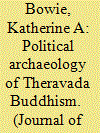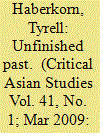| Srl | Item |
| 1 |
ID:
126031


|
|
|
|
|
| Publication |
2011.
|
| Summary/Abstract |
They gave me a mango at breakfast in Chiang Mai, in northern Thailand, in the boutique hotel where I was staying. The mango was beautifully presented in Thai style: two halves on the plate with the seed removed. The halves were cut into even bite-sized slices. The mango was not too ripe but full of flavour. Each firm portion tasted identical to the last one, and I had to restrain myself from eating too quickly. The mango was mouth- wateringly delicious.
|
|
|
|
|
|
|
|
|
|
|
|
|
|
|
|
| 2 |
ID:
181272


|
|
|
|
|
| Summary/Abstract |
As the central Thai government expanded into the northern region during the early decades of the twentieth century, thousands of northern monks created a movement spearheaded by the famous monk, Khruba Srivichai (1878–1939). Even after Srivichai's multiple arrests and the disrobing of some 1,000 of his disciples in 1936, tensions continued. Oral histories reveal underlying differences in religious interpretations; one was outrage at the construction of funerary chedis on temple grounds. To understand why northerners found this practice sacrilegious, this essay undertakes an ideological archaeology into the ‘space of dissension’ of differing central and northern Thai funerary practices.
|
|
|
|
|
|
|
|
|
|
|
|
|
|
|
|
| 3 |
ID:
161706


|
|
|
|
|
| Summary/Abstract |
Conjunctures of globalization and education have shaped the intersection of Buddhist monasticism and international tourism in the Northern Thai city, Chiang Mai. International tourism in Chiang Mai has been popular since the 1990s, while monks from all over Thailand and South and Southeast Asia have come to Chiang Mai in large numbers to pursue higher education in English since the 2000s. Focusing on Buddhist temples that contain a Monk Chat programme, where tourists and monks engage in conversation, this article analyses the responses of Buddhist monks towards a range of international tourists. Utilizing the perspectives of Buddhist monks through interviews reveals attitudes towards Western and Asian tourists as situated within broader discourses of Thai society. Investigating these attitudes and responses within the context of wider state, regional, and transnational influences, I argue that attitudes towards religious others are inextricably connected to missionization.
|
|
|
|
|
|
|
|
|
|
|
|
|
|
|
|
| 4 |
ID:
087031


|
|
|
|
|
| Publication |
2009.
|
| Summary/Abstract |
This article examines the struggle for land tenancy reform and the assassination of Farmers' Federation of Thailand (FFT) leaders in northern Thailand during the period of democratic politics between 14 October 1973 and 6 October 1976 as unresolved, ambiguous, and linked events in the recent Thai past. During the 1973-1976 period, farmers became new political and legal subjects as they fought to pass and then implement the 1974 Land Rent Control Act. Drawing on provincial archival records, the author contextualizes how and why tenancy became a contentious issue between farmers and landlords beginning in the 1950s and then examines the anxious and violent backlash with which their organizing in the 1970s was met by state, para-state, right-wing, and landholding elites. The author interrogates the conditions and effects of the assassinations by writing about the life and death of one of the leaders of the FFT, Intha Sribunruang. The denials by a range of state officials of the political nature of Intha and other FFT leaders' murders underscore both the importance of the FFT's work and the necessity to critically evaluate the assassinations. The author concludes by arguing that the lack of resolution surrounding the struggle for tenancy reform and the assassinations of FFT leaders continues to resonate in present-day politics. An Appendix to the article offers the first English-language list of the FFT leaders known to have been killed or victimized by violence between 1974 and 1979.
|
|
|
|
|
|
|
|
|
|
|
|
|
|
|
|